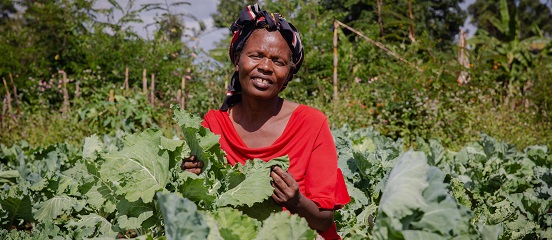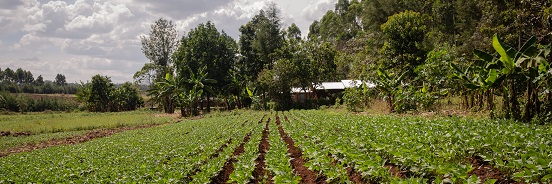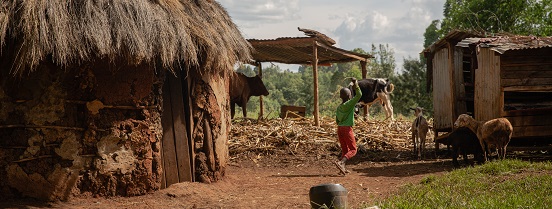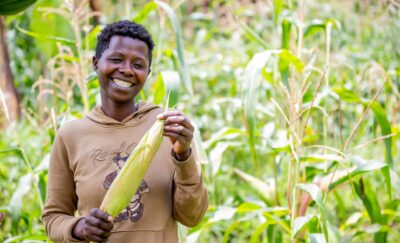News
6 October 2020
Western Kenya survey highlights the impact of COVID-19 on smallholders

Horticulture farmers in western Kenya taking part in a survey undertaken by Farm Africa have highlighted the extent to which the COVID-19 pandemic has dealt smallholders a major economic blow.
Smallholder horticultural farmers who responded to the survey reported how the pandemic has limited their access to inputs and markets, pushed up their price of production and caused household incomes to plummet.
The rapid feedback survey, which recorded views of 419 farmers taking part in the NGO’s Growing Futures market access initiative in Trans Nzoia County in June 2020, highlights the potential of the pandemic to disrupt the country’s food and farming systems.
The results underline the need for targeted support to help smaller grower enterprises, who have been disproportionately affected by the pandemic’s impact on the agriculture sector, withstand the effects on household incomes.

The survey revealed a widespread drop in demand for agricultural produce in Trans Nzoia, with 69% of the smallholders reporting lower than usual sales volumes and only 17% recording increased sales volumes. Two thirds (67%) of the farmers reported that the price per kilo of produce had fallen. The impact of this reduced demand on farmers’ earnings was clear, with 67% of respondents reporting a significant reduction in household incomes as a direct result of the pandemic, 24% declaring slight reductions, and 9% reporting no change or increases.

The farmers attributed the fall in demand to curfews and travel restrictions, which prevented potential buyers from accessing cross county markets, as well as limiting the hours of business operation.
While at the same time feeling a squeeze on income, a majority of farmers reported experiencing rising costs of both agricultural inputs and household essentials. As public and private transport actors adhere to government regulations that have reduced passenger carrying capacity, increased travel costs incurred by input suppliers are being shifted to the end consumers (farmers).
A hike in the prices of inputs has affected 84% of the farmers who took part in the survey, with a significant 80% pointing out possible planting delays due to the high input costs and market uncertainty. At a time when 64% of farmers reported that household expenses were on the rise due to increased prices of food and other basic commodities, this is a heavy burden for smallholders.
It’s a burden the farmers are ill equipped to bear. Half of the interviewees reported that they did not have an emergency fund, while 52% of farmers confirmed that they had no capital reserved to support their farming activities.
In addition to putting their households at risk, lack of savings could potentially affect agricultural production in coming months as the farmers could resort to subsistence farming to protect their reserves at the expense of commercial farming. In the event that their revenues were to drop by half or more, 39% of the farmers noted that they would only continue with their operations for a maximum of three weeks while 22% would carry on up to a duration of two months.
Farm Africa’s experience supporting young farmers to engage in market-led vegetable production in Trans Nzoia has illustrated the potential for growth in the Kenyan horticulture sector. Over the course of a three-year phase of the Growing Futures market initiative funded by the Medicor Foundation, the average incomes of the 2,400 participants increased from Ksh 34,522 in 2018 to Ksh 57,746 in 2020 following training in agronomic practices and business planning. Together, they produced and sold 12,748 metric tonnes of vegetables.

The success of the Growing Futures initiative in recent years, together with the rebounding national horticulture export earnings in the first half of 2020 as indicated by statistics from the Directorate of Horticulture, give cause for optimism to farmers in Trans Nzoia. However, the unprecedented challenges posed to smallholder farmers by the COVID-19 pandemic call for action to be taken to ensure the pandemic does not reverse hard-won progress in getting horticulture markets moving.
To remain in production, smallholder farmers urgently need access to quality agricultural inputs, such as quality seeds, fertilisers and pesticides, at affordable prices during and after the pandemic. Input suppliers should be encouraged or incentivised to explore economical and more efficient delivery options such as online platforms to cut costs and minimise the risk of contracting and transmitting the virus.
To lessen loss of income during the pandemic, farmers would benefit from training in the diversification of income streams. For example, growing early maturing crops that are in high demand during the crisis would diversify their portfolio and spread risk.

Small-scale farmers require support to develop financial literacy skills so as to understand the importance of having capital to fall back on to enable them to survive financial downturns. There is also an urgent need to spearhead last-mile credit access to vulnerable households.
The absence of a savings plan among the farmers is likely to reduce the funds available to traditional loans and savings groups, which are vital sources of emergency and development funds to the smallholders. This spells out the importance of linking smallholders to alternative financial services providers who can provide appropriate credit during crises, such as a provision for longer repayment periods at affordable interest rates.
In response to COVID-19 protection needs, personal protective equipment (PPE) is needed in areas frequented by a large number of people such as vegetable aggregation centres and pack houses in order to protect the farmers from the virus. In the event of positive COVID-19 cases within the farmer groups, training on business continuity will ensure seamless production.
In the long run, investing in affordable, user-friendly and accessible digital infrastructure to link smallholder farmers to markets would bolster food systems and cushion vulnerable communities from shocks such as climate extremes and pandemics.




